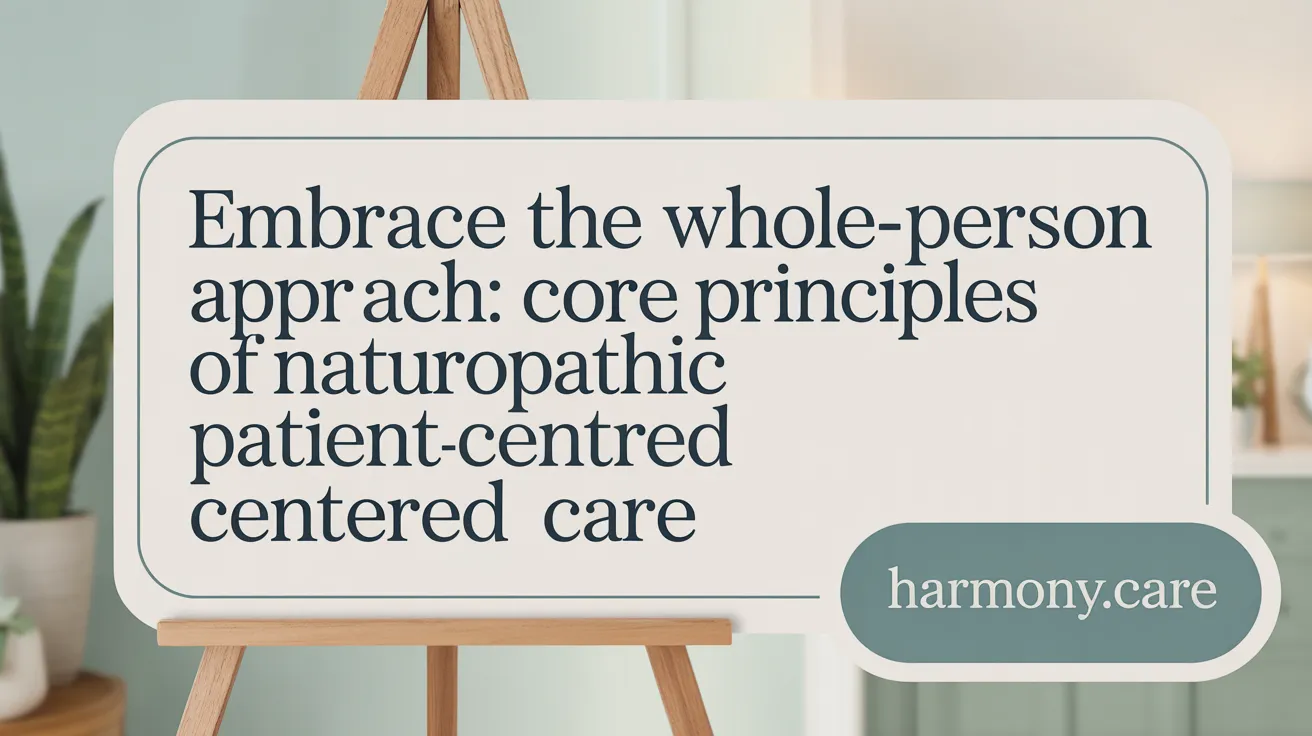Embracing a Holistic Approach to Wellness
Naturopathic medicine is gaining recognition as a vital player in the evolution of healthcare, emphasizing a patient-centered model that prioritizes whole-person care, prevention, and empowerment. This approach integrates traditional wisdom with modern science to offer personalized and holistic treatments, fostering greater patient satisfaction and improved health outcomes. This article explores how naturopathic medicine improves patient-centered experiences by focusing on individualized care, active patient involvement, and collaborative therapeutic relationships.
Foundations of Patient-Centered Care in Naturopathic Medicine

What are the foundational principles of naturopathic medicine related to patient-centered care?
Naturopathic medicine is founded on six core principles that emphasize treating the whole person—mind, body, and spirit. These principles include identifying and addressing the root causes of illness rather than just alleviating symptoms, educating and empowering patients for self-healing, using the gentlest and least invasive treatments, and focusing heavily on prevention. Learn more about the six guiding principles of naturopathic medicine and patient-centered care.
Patient-centered care components
In naturopathy, patient-centered care embodies effective communication, partnership, and promotion of health. This means listening carefully to patients’ concerns, involving them collaboratively in decision-making, and tailoring health promotion strategies based on individual preferences, life experiences, and social circumstances. Explore core components of patient-centered care in naturopathic medicine.
Impact of longer consultations
Naturopathic doctors typically spend more time with their patients—often up to two hours per visit. This extended time enables comprehensive lifestyle assessment, exploration of dietary habits, understanding of environmental and emotional factors, and formulation of personalized treatment plans. Longer consultations foster trust, allowing patients to feel heard and understood, which enhances engagement and adherence. Read about the benefits of longer patient visits and holistic assessments in naturopathic care.
Holistic treatment philosophy
Naturopathy adopts a holistic philosophy that treats the person as a whole, considering physical, emotional, social, and spiritual dimensions. Treatments integrate natural and evidence-based methods such as nutrition, herbal medicine, lifestyle counseling, physical therapies, and mind-body techniques. This approach supports sustainable health improvements and addresses complex, chronic conditions by targeting underlying causes rather than isolated symptoms. Understand the holistic approach and evidence-based naturopathic treatments.
Empowering Patients Through Education and Partnership

How does naturopathic medicine empower patients in their healthcare journey?
Naturopathic medicine promotes patient empowerment by creating a therapeutic partnership where patients are active participants in their care. Practitioners emphasize open communication, trust, and respect for patient preferences, which builds a safe space for patients to share their health experiences honestly (Strong ND-patient relationships, Empowerment in naturopathic consultations, Naturopathic physicians' patient-centered approach).
Education is central to this approach. Naturopaths provide detailed guidance that improves patients' health literacy, helping them understand the root causes of their conditions and the rationale behind treatment options (Naturopathic medicine principles, Patient-shared knowledge in clinical decision-making). This knowledge boosts patients' confidence and sense of control (Patient-shared knowledge in clinical decision.
Shared decision-making is foundational to naturopathic care. Patients collaborate closely with their naturopathic doctors (NDs) to develop personalized treatment plans (Patient-centered care in naturopathic medicine, Shared decision-making in naturopathy). This collaboration fosters self-efficacy, enabling patients to implement lifestyle changes, dietary adjustments, and natural therapies effectively (Lifestyle-oriented self-care in naturopathy, Naturopathic care and diabetes management).
By focusing on holistic wellness and self-care, naturopathy empowers patients to be responsible for their health beyond clinical visits, promoting sustained behaviors that support healing and prevention (Patient-centered care in naturopathic medicine, Person-centered care overview).
How education supports self-care and better health outcomes
- Detailed explanations tailor treatments to individual needs (Grow Your ND Practice with Patient Referrals)
- Skill-building enhances patient capability to manage health (Health promotion in naturopathic care
- Resources address lifestyle, diet, stress, and more (Naturopathic care approach)
- Encouragement of patient autonomy nurtures long-term engagement (Empowerment in naturopathic consultations
This model contrasts with more paternalistic medical approaches by valuing patients’ lived experiences and knowledge, thus advancing more effective and satisfying healthcare partnerships (Patient-shared knowledge in clinical decision, Naturopathic physicians' patient-centered approach.
Personalized and Holistic Clinical Approaches Tailored to Individual Needs
In what ways does naturopathic medicine personalize care to improve patient experiences?
Naturopathic medicine distinguishes itself through highly personalized care that closely considers each patient's unique health situation. This personalization happens through comprehensive lifestyle and holistic health assessments that explore diet, physical activity, stress levels, environmental exposures, and even social and financial factors affecting health (Naturopathic Medicine Principles, Naturopathic care approach, Holistic treatment philosophy in naturopathy).
Practitioners develop individualized treatment plans tailored to the patient's specific needs. These plans may include dietary changes, herbal medicines, nutritional supplements, and mind–body therapies such as yoga or meditation (Evidence-based naturopathic treatments, Innovations in naturopathic medicine, Personalized Treatment Plans. By emphasizing the root cause of illness rather than simply addressing symptoms, naturopathy promotes sustainable healing and wellness (Naturopathic medicine principles).
Longer consultation times—often up to an hour or more—allow naturopathic doctors to engage in thorough discussion and understanding of the patient's lifestyle, values, and health goals (Longer patient visits in naturopathic care, Consultation time in naturopathy). This fosters partnership and deeper trust, empowering patients to actively participate in managing their health (Strong ND-patient relationships, Patient empowerment in naturopathy, Patient-centered care in naturopathic medicine).
Additionally, this holistic approach integrates behavioral counseling and patient education, enhancing self-efficacy and adherence to individualized plans (Patient education in diabetes management, Empowerment in naturopathic consultations). Consideration of environmental influences and personalized recommendations make naturopathic care distinct in improving patient experience and outcomes (Naturopathic patient-centered care, Lifestyle-oriented self-care in naturopathy, Patient-centered care in naturopathic medicine.
Behavioral Change and Prevention: Transforming Chronic Disease Management
How does naturopathy improve patient-centered experiences through prevention and self-care?
Naturopathy centers on prevention and behavioral change, encouraging patients to adopt lifestyle-oriented self-care practices. These include nutritious diets, regular physical activity, effective stress management, and mind–body therapies such as yoga. By focusing on these natural and self-directed strategies, naturopathic care boosts patient empowerment and promotes active participation in health maintenance.
This patient-centered model provides longer consultations for comprehensive lifestyle evaluation and tailored recommendations. It fosters improved adherence to healthy behaviors and helps patients feel listened to and supported, enhancing their overall care experience.
Importantly, naturopathy's preventive approach can positively influence chronic disease management. For conditions like type 2 diabetes and depression, naturopathic interventions that combine dietary supplements, herbal medicines, and lifestyle counseling have demonstrated favorable outcomes.
Moreover, the emphasis on behavioral modification often results in decreased reliance on prescription medications and surgical interventions. This not only reduces risks associated with overprescribing but also aligns with a more sustainable healthcare model focused on wellness rather than disease (Naturopathy and World Health Organization recognition).
Through encouraging prevention and self-care, naturopathy transforms clinical practice by fostering long-term disease control and patient well-being (Naturopathy's role in chronic disease management.
Building Trust and Strong Therapeutic Relationships

Communication as a Core Treatment Element
In naturopathic care, communication is not just an add-on; it is central to all treatment. Practitioners emphasize open, honest dialogue that encourages patients to share their complete health histories and daily experiences. This thorough communication fosters trust and uncovers important insights that shape personalized care (Strong ND-patient relationships, Naturopathic medicine principles, patient-shared knowledge in clinical decision-making).
Creating Safe Spaces for Honest Dialogue
Naturopathic practitioners go to great lengths to create environments where patients feel safe and supported. This safe space allows patients to be vulnerable, fostering transparency and honesty about their health challenges. Feeling understood and respected helps patients engage more fully in their healing process (Empowerment in naturopathic consultations, Person-centered care overview, Therapeutic relationships in naturopathy.
Shared Decision-Making
Trust builds a foundation for shared decision-making, where patients actively participate in their care plans. Naturopathic doctors and patients work as partners, considering patient preferences, lifestyles, and goals. This collaboration motivates patients to stick with their treatment plans and boosts their confidence in managing their health (Naturopathic physicians' patient-centered approach, Naturopathic medicine principles, Integration of naturopathic medicine).
Impact of Trust on Treatment Adherence
A trusting therapeutic relationship directly influences patients' adherence to recommendations. When patients trust their naturopathic provider, they are more likely to follow through with lifestyle changes, supplements, or therapies. This adherence leads to improved health outcomes and greater patient satisfaction (Patient-shared knowledge in naturopathic clinical decision-making, Naturopathic physicians' patient-centered approach, Naturopathic care approach.
What role do trust and communication play in enhancing patient experiences in naturopathic care?
Trust and honest communication are foundational in naturopathic medicine, creating a safe space for patients to share personal health histories and experiences. This openness enables accurate diagnosis and effective treatment planning. Shared decision-making between patients and practitioners fosters a collaborative partnership, improving adherence to treatment plans, confidence in care, and ultimately better clinical outcomes (Naturopathic medicine principles, Patient-centered care in naturopathic medicine, Naturopathic principles.
Integrating Patient-Shared Knowledge and Experiential Insights

Value of patient-shared information
Naturopathic practitioners place great importance on information shared directly by patients, considering it a vital component of clinical care. Patients' personal health history and their experiences living with health conditions are seen as critical sources of insight that deeply inform diagnosis and treatment planning (patient-shared knowledge in naturopathic clinical decision-making, patient-shared knowledge in clinical decision.
Clinical decision-making processes
In naturopathy, clinical decisions often rely heavily on patient-shared knowledge. Practitioners use this information alongside laboratory tests and medical assessments, trusting patient narratives to guide holistic and personalized care approaches. More than 90% of naturopathic doctors regard patient-provided information as extremely or very important (patient-shared knowledge in clinical decision-making.
Contrast with conventional healthcare practices
This extensive trust in patient-shared experiential knowledge distinguishes naturopathic care from many conventional healthcare settings, where patient input may be undervalued or overlooked. The naturopathic model fosters collaborative partnerships between practitioner and patient, allowing shared decision-making that better aligns with individual patient values and preferences (Naturopathic physicians' patient-centered approach, patient-shared knowledge in clinical decision.
Enhancing patient engagement
By actively incorporating patient insights, naturopathy enhances patient engagement and empowerment. Patients become active participants rather than passive recipients, which boosts adherence to treatment plans and improves health outcomes. This approach strengthens communication, builds trust, and promotes self-efficacy in managing chronic conditions and wellness goals (Empowerment in naturopathic consultations, Strong ND-patient relationships).
| Aspect | Naturopathic Approach | Conventional Healthcare Contrast |
|---|---|---|
| Use of patient knowledge | Highly valued and frequently used in decision-making | Often secondary to laboratory and clinical measurements |
| Trust in patient experience | High, seen as trustworthy and informative | Variable, sometimes undervalued |
| Patient engagement | Encouraged through shared decision-making | Often limited, more provider-directed |
| Clinical outcomes | Improved via holistic and individualized treatment plans | Sometimes focused heavily on symptoms and prescriptions |
Together, these features highlight how integrating patient-shared knowledge enriches naturopathic care and nurtures a more responsive and effective healthcare experience (Naturopathic physicians' patient-centered approach, patient-shared knowledge in naturopathic clinical decision-making).
Collaborative Networks: Expanding Naturopathic Care Through Referrals and Integration
How does collaboration with other healthcare professionals improve patient-centered experiences in naturopathy?
Naturopathic practitioners build strong collaborative relationships with a variety of healthcare professionals such as chiropractors, nutritionists, and medical doctors. This interprofessional collaboration enables cross-referrals that ensure patients receive comprehensive, coordinated care tailored to their unique needs. By integrating naturopathic practices alongside conventional healthcare, patients benefit from a holistic approach that considers physical, emotional, and lifestyle factors (Strong ND-patient relationships, Collaboration Between Naturopathy and Conventional Medicine, Grow Your ND Practice with Patient Referrals.
Integration into Conventional Healthcare Settings
Naturopathic medicine is increasingly being incorporated into hospital and primary care environments. Studies show that integrating naturopathic methods in acute inpatient care elevates patient satisfaction, improves adherence to treatment, and strengthens interactions between patients and healthcare teams. Multimorbid patients with complex health issues respond particularly well to this patient-centered combination, receiving coordinated support that addresses diverse health needs (Integration of naturopathic medicine, Patient satisfaction with naturopathic integration, Integration of naturopathic medicine.
Benefits of Integrative Care Models
Integrative care models that combine naturopathy with conventional medicine foster better health outcomes and patient experiences. These models reduce fragmentation by promoting communication and shared decision-making among providers. Additionally, patients often experience more time and attention, holistic assessments, and personalized treatment plans. This synergy helps optimize therapies for chronic and acute conditions while empowering patients in their healing journey (Integrative medicine healing-oriented approach, Benefits of patient-centered care, Naturopathic medicine principles.
Through these collaborative networks and integrative approaches, naturopathic care expands its reach and effectiveness, reflecting a modern, prevention-oriented healthcare model that values patient preferences and a broad spectrum of healing modalities (Naturopathy and World Health Organization recognition, Naturopathy as primary care model, Holistic treatment philosophy in naturopathy.
Innovations and Emerging Trends Enhancing Patient Engagement and Care Quality
What innovations in naturopathic medicine are improving patient-centered experiences?
Naturopathic medicine is evolving through the integration of evidence-based naturopathic treatments that enrich patient care. Advances such as microbiome testing and functional medicine laboratory analysis allow practitioners to tailor treatments precisely based on individual patient needs and biological profiles. These personalized diagnostic tools provide deeper insights into patients' health, enabling customized interventions that align with their unique conditions and preferences.
Technological progress also plays a crucial role. Enhanced diagnostic methods, combined with sophisticated data analytics, support more accurate assessments and ongoing monitoring, fostering patient-shared knowledge in clinical decision-making. This promotes empowerment in naturopathic consultations and patient empowerment, key components of the naturopathic patient-centered approach in naturopathic medicine.
Education and professional standards have concurrently advanced. Expanding higher education in naturopathic medicine ensure practitioners receive comprehensive, science-backed training. Meanwhile, increasing regulation and licensing of naturopathic practitioners safeguard treatment quality and patient safety, boosting public confidence in naturopathic care.
Together, these emerging trends accelerate naturopathy's transformation into a more precise, trusted, and holistic health discipline. The synergy between natural therapies and cutting-edge science enhances care quality while honoring strong ND-patient relationships and individualized patient experiences and empowerment.
Fostering Patient Satisfaction through Positive Experiences and Accessibility

Creating welcoming environments
Naturopathic clinics cultivate a positive atmosphere that makes patients feel valued and comfortable. Features such as friendly staff, inviting décor, and smooth administrative processes contribute to a welcoming experience. Practices often facilitate easy appointment scheduling, including online booking options, enhancing patient convenience and satisfaction.
Use of effective communication and responsiveness
A core aspect of naturopathic care is empathetic communication. Practitioners listen attentively, show genuine interest, and provide clear explanations tailored to individual patient needs. Timely responses to patient inquiries and follow-ups help build trust and ensure patients remain engaged in their care plans. This open dialogue empowers patients and supports better health outcomes.
Insurance coverage and affordability
Access to naturopathic care is greatly enhanced by increasing insurance coverage for these services. When patients can use insurance benefits for naturopathic treatment, financial barriers decrease, boosting utilization. Affordable care encourages more individuals to seek preventive and holistic care, fostering wider acceptance of naturopathy and reinforcing its role in primary health management.
Enhancing long-term patient loyalty
To foster enduring relationships, naturopathic practices focus on personalized care, addressing patient preferences and lifestyle factors. Educational efforts about naturopathic medicine empower patients to actively participate in their health journey. Encouraging patient referrals through quality care and patient satisfaction further strengthens practice growth and long-term engagement.
| Strategy | Description | Patient Benefit |
|---|---|---|
| Welcoming Environments | Friendly staff, inviting settings, easy bookings | Comfort, convenience |
| Effective Communication | Empathetic listening, clear information, quick follow-up | Trust, empowerment |
| Insurance & Affordability | Coverage by insurers, cost-effective care | Accessibility, reduced financial burden |
| Long-Term Engagement | Personalized plans, patient education, referrals | Loyalty, sustained health improvement |
Integrating these approaches creates a patient-centered experience that nurtures satisfaction and encourages ongoing health management within naturopathic medicine.
The Future of Patient-Centered Care in Naturopathic Medicine
Naturopathic medicine’s commitment to holistic, patient-centered care is transforming how health is understood and managed. By prioritizing personalized treatments, patient empowerment, and collaborative partnerships, naturopathy offers a compelling alternative to conventional care models that often neglect the whole person. Innovations in clinical practice, integration with other healthcare disciplines, and a focus on prevention and education are driving improved patient experiences and health outcomes. As naturopathic medicine continues to evolve and expand, its patient-centered approach will remain a cornerstone of healing and wellness for diverse populations worldwide.
